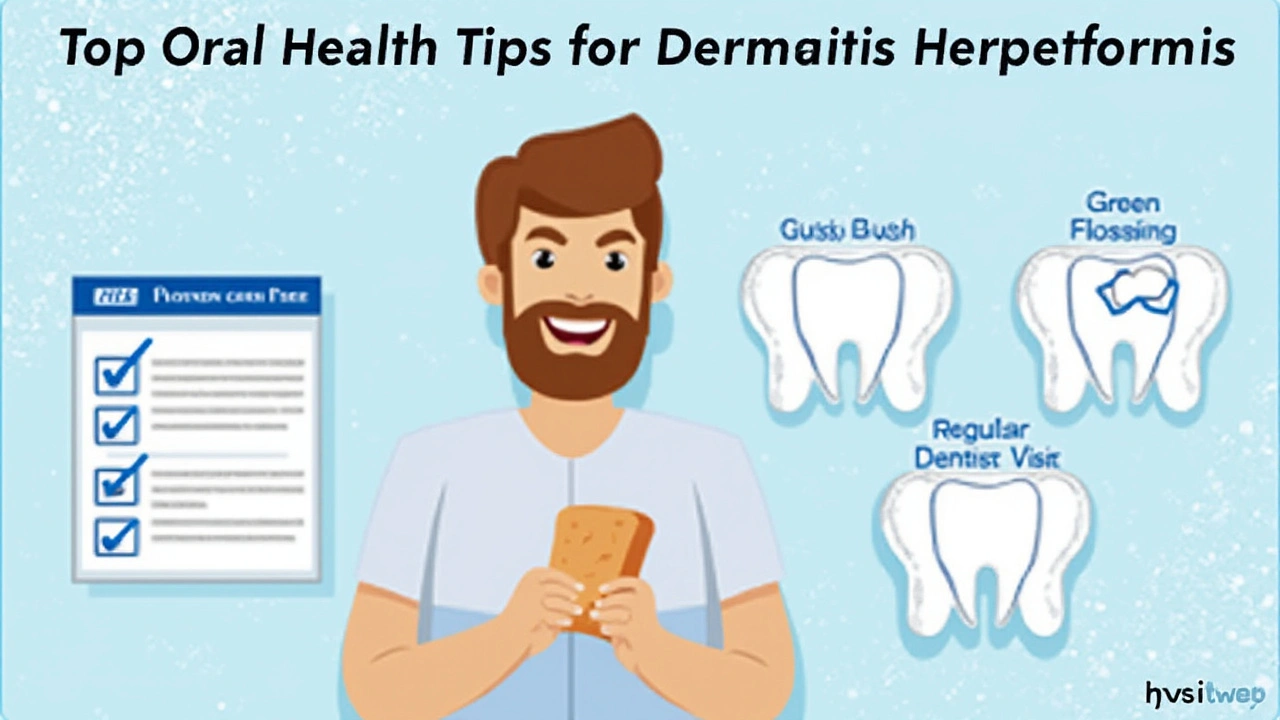Ever wondered why your mouth feels extra sensitive or sore along with your skin flares? Dermatitis herpetiformis doesn’t just mess with your skin—it also has a sneaky way of showing up inside your mouth. Those little ulcers or irritated gums you notice aren’t random. That stinging or burning can often be traced back to the same immune reactions causing your skin issues.
If you’re dealing with DH, ignoring oral health can make everyday things like eating toast or brushing your teeth feel like a brutal challenge. The good news? Simple changes—like switching to a soft toothbrush, rinsing with a gentle mouthwash, or steering clear of gluten—actually help a lot more than you’d expect. Paying attention to these daily details makes life less painful and keeps your smile in better shape.
- Dermatitis Herpetiformis: The Basics
- How DH Affects Your Mouth
- Everyday Care Tips for Teeth and Gums
- Gluten-Free Choices for Oral Health
- When to Talk to Your Dentist
Dermatitis Herpetiformis: The Basics
If you’ve just heard the words dermatitis herpetiformis (let’s just call it DH), it can sound confusing. DH isn’t a type of herpes; it’s actually an itchy, blistering skin condition that happens when your body can’t handle gluten. Most people who get DH also have some level of celiac disease going on, whether they notice gut symptoms or not.
DH usually shows up as clusters of little bumps and blisters on your elbows, knees, back, or butt—places you probably wouldn’t expect. The itching is serious. What’s really happening is your body’s immune system attacks its own skin and sometimes the lining of your mouth in response to gluten (a protein in wheat, barley, and rye).
It mostly strikes adults—usually in their 30s and 40s—though anyone can get it. Men are a bit more likely to get DH than women. Here’s the kicker: DH goes hand-in-hand with gluten intolerance, so if your skin is flaring, the food you eat matters more than you think.
- Avoiding gluten is still the only proven way to control DH long-term.
- Some folks need a prescription pill called dapsone to calm down the itching while their gut heals.
Doctors usually diagnose DH with a skin biopsy. If you already have celiac disease and keep getting weird rashes that won’t quit, it’s worth asking your doctor about DH.
| Quick Facts about DH | Details |
|---|---|
| Typical Age of Onset | 30-40 years old |
| Common Locations | Elbows, knees, scalp, back, butt |
| Biggest Trigger | Gluten |
| Main Treatment | Gluten-free diet and sometimes dapsone |
If you’ve never heard of DH before, you’re not alone. It’s estimated to hit about 1 in 10,000 people in the U.S., but for those who have it, changing what you eat can totally change your skin—and your mouth health, too.
How DH Affects Your Mouth
When you think about dermatitis herpetiformis (DH), skin rashes usually come to mind first. But here’s what often gets missed: DH can mess with your mouth just as much as your skin. If you’re dealing with this, you might notice ongoing mouth ulcers, a burning tongue, sore gums, or even enamel problems. This isn’t just random. It happens because DH is an autoimmune disease tied to how your body reacts to gluten, which ends up causing irritation inside your mouth too.
Some studies show up to 50% of people with DH get oral symptoms at some point, even before they know they have the condition. The most common problems include:
- Mouth ulcers: Painful spots that make talking and eating tough.
- Swollen or bleeding gums: Inflammation can show up along your gum line for no obvious reason.
- Glossitis: This is when your tongue feels smooth, sore, or swollen—sometimes it gets bright red.
- Tooth enamel defects: You might see white, yellow, or brown spots on your teeth, and they can be more sensitive to hot or cold foods.
If you’re not careful, these minor annoyances can turn into real problems. Swollen gums make you more likely to develop gum disease. Frequent ulcers can ruin your appetite and mess with your mood. And let’s be honest, nobody wants their teeth looking patchy or feeling sensitive all the time.
| Common Oral Issues | How Often in DH? |
|---|---|
| Mouth Ulcers | 40-50% |
| Swollen/Bleeding Gums | 25-30% |
| Enamel Defects | Up to 60% |
So, when you’re paying attention to your oral health with DH, you’re not just being extra cautious—you’re preventing problems that stack up fast and add a lot of frustration to daily life. It’s surprisingly common for dentists to spot DH-related mouth issues before anyone puts two and two together on the skin side. That’s why knowing the mouth symptoms can actually help you catch DH sooner and manage it better.

Everyday Care Tips for Teeth and Gums
Oral health needs extra attention when you're living with dermatitis herpetiformis. Small changes in your routine matter—a lot. The right habits will settle that annoying mouth irritation and help prevent bigger dental headaches down the road.
Start by ditching harsh dental products. Skip toothpastes with sodium lauryl sulfate (SLS). SLS often triggers more mouth ulcers and burning, which, if you’ve got DH, you really don’t need. Instead, grab a toothpaste made for sensitive mouths and double-check the label for gluten if you’re gluten-sensitive.
Gentle brushing makes a difference. Hard bristles scratch up gums that are already cranky. Go with a soft-bristled toothbrush and brush twice a day. And don’t forget to change that toothbrush every three to four months—old ones just hang on to bacteria and lose their gentle touch.
Flossing is still important, even if your gums bleed. Just be careful, floss gently, and don’t rush it. If regular floss is uncomfortable, try those soft floss picks instead. Trust me, once you get the hang of it, your gums will thank you for the extra care.
- Use alcohol-free mouthwash to avoid more burning
- Rinse after every meal, especially if you’re prone to mouth ulcers
- Drink water instead of sugary drinks that fuel bacteria growth
- Apply a small dab of coconut oil to any mouth sore for quick relief
- Keep a food diary—some foods make symptoms way worse, and tracking helps spot patterns fast
People with dermatitis herpetiformis tend to get more mouth problems like blisters and gum issues. In fact, research shows that about one in five folks with DH report recurring mouth sores. That’s a lot more than average—so staying on top of the little things really adds up.
| Tip | How Often | Why It Helps |
|---|---|---|
| Soft Brushing | Twice Daily | Prevents gum injury |
| Alcohol-Free Rinse | Once Daily | Reduces soreness |
| Floss Gently | Daily | Lowers plaque, protects gums |
If things still feel off after a couple of weeks, or you’re getting mouth sores all the time, call your dentist. Problems like bleeding or painful gums aren’t just a random part of life with DH—you can absolutely get relief. Stay proactive and keep your oral health routine tight. Your smile—and your comfort—will show the difference.
Gluten-Free Choices for Oral Health
Going gluten-free changes more than your grocery list—it can totally shift how comfortable your mouth feels with dermatitis herpetiformis. Gluten isn’t just hiding in bread and pasta. You’ll actually spot it in some toothpastes, mouthwashes, and even the flavorings used in chewable vitamins. If you keep getting sores, burning, or irritation, gluten in something unexpected might be the troublemaker.
Most dentists who know about DH will tell you: always check labels. Even small amounts of gluten can trigger a reaction. Here’s what to zero in on when making gluten-free oral health choices:
- Read every label. Don’t assume a product is gluten-free unless it clearly says so. Watch for hidden sources like malt flavoring or wheat starch.
- Ask your dentist for product suggestions. Some dental offices know specific brands of toothpaste or rinses that skip gluten entirely.
- Review your chewing gum and mints. Gluten can show up in these, too. Pick brands that guarantee they’re gluten-free.
- Avoid shared containers. Cross-contamination is real at home, especially if your partner or kids are not gluten-free.
- Keep an emergency list. Jot down go-to brands and safe snacks you trust, so you’re not left guessing at the store.
How common are gluten ingredients in oral products? A Canadian survey back in 2022 found that nearly 8% of toothpaste brands sampled were not gluten-free—even when they looked "benign". When in doubt, most US-based gluten-free advocacy groups recommend reaching out to product manufacturers directly.
| Product Type | Potential Gluten Risk | Recommended Action |
|---|---|---|
| Toothpaste | Flavorings, thickeners | Check label, call company |
| Mouthwash | Grain-derived alcohols | Pick certified GF product |
| Chewing gum | Wheat-based binders | Choose GF brand |
| Vitamins/Supplements | Fillers, coatings | Verify GF status |
Swapping to gluten-free choices can take away a lot of the guesswork. It also helps reduce gum problems and mouth irritation for most people with dermatitis herpetiformis. If something feels off even after making the switch, it’s worth talking to your doctor or dentist to review all products you use regularly.

When to Talk to Your Dentist
If you live with dermatitis herpetiformis, keeping your oral health on track isn’t just a good idea—it’s a must. There are some clear signs when a regular brush and floss routine just won't cut it. Persistent mouth sores, bleeding gums, odd bumps, or burning sensations that don’t get better? That’s when your dentist needs to get involved.
A lot of folks dealing with DH can get repeat mouth ulcers or irritated gums that linger for weeks. If ulcers last more than two weeks or you’re finding new ones pop up all the time (even after going gluten-free), don’t wait. It’s not just discomfort—sometimes, DH can make people more prone to infections or even trigger other autoimmune troubles in the mouth, like lichen planus.
Here’s when you should pick up the phone and call your dentist:
- Sores don’t heal or keep coming back
- Your gums are swollen, red, or bleed when brushing
- Pain makes it hard to eat, drink, or even talk
- You notice white patches, spots, or other changes inside your mouth
- Any unusual taste or bad breath that sticks around
Regular check-ups matter too. Dentists can spot DH-related changes early, often before you even feel pain. According to the American Academy of Oral Medicine, “Dental professionals can play a big role in recognizing gluten-related disorders by spotting changes in oral tissues that patients might overlook.”
Dentists are usually the first healthcare providers to identify oral symptoms of autoimmune skin diseases like dermatitis herpetiformis. A good dental exam can prevent small issues from turning into big problems. – Dr. A. Ship, Oral Medicine Specialist
If you’re just starting out with a gluten-free diet, your dentist can even help guide you on products safe for your teeth and gums. Many toothpaste and mouthwash brands still sneak in gluten as a binder or flavoring—just another thing to watch out for that most people miss.
Pro tip: Always let your dentist know about your DH diagnosis and any meds you’re taking, especially if you use dapsone or steroids. This helps them make the best calls for your dental care plan and avoid treatments that could make things worse.



Comments
Oh, great, another piece preaching gluten avoidance like it’s the holy grail. Sure, managing gluten is crucial with dermatitis herpetiformis, but it’s not exactly rocket science, folks.
What I appreciate here is the clear link made between gluten and oral health—something many ignore. People always talk about gut health, but teeth and gums are part of the ecosystem too. And not just a tiny part either.
That said, the advice feels a bit oversimplified for those who need in-depth management strategies. Do we get tips on specific dental products? No. Do we talk about inflammation markers in the mouth? Nada.
Still, for newbies, this is a decent starting point. A stronger focus on why gluten triggers such reactions would push this from okay to excellent.
I'm left wondering though, how often should one really visit a specialist when dealing with this? Prevention sounds good, but practical timelines would help.
Yeah, I found this pretty helpful, especially the part about quick daily habits. Sometimes the best advice isn’t complicated at all.
Spotting mouth problems early is so important and the article makes it feel achievable for anyone.
I agree with the focus on comfort too—because oral pain can seriously mess with your quality of life.
Thanks for sharing, it’s nice to see an angle on oral health that’s not just about brushing and flossing but connects to bigger health issues.
Wow, talk about dancing around the obvious—gluten is the culprit, avoid it, and your mouth might stop feeling like the surface of Mars. But noooo, let’s just sprinkle some ‘smart tips’ and call it a day.
Honestly, I want more meat here, not the usual fluff. I mean, if you’ve got dermatitis herpetiformis, probably you’ve heard to ditch gluten a hundred times.
What about the nightmare of dealing with flare-ups when you slip up? What about pain management strategies? Come on folks, don’t leave us hanging with the basics.
Still, I guess it’s a decent primer for people new to all this. Just wish it wasn't sugarcoated.
I really appreciated this breakdown! Sometimes health info can get so technical that it’s hard to find practical advice you can actually use day-to-day.
This piece keeps things simple without dumbing it down. I'd be curious though—are there any recommended toothpaste or mouthwash brands that are better suited for people with dermatitis herpetiformis? That might be a game changer.
I’m still trying to wrap my head around how gluten literally impacts oral health on a biological level. Maybe a follow-up article with some science behind it would be awesome?
Definitely bookmarking this one for friends who just got diagnosed!
Really cool post! I think people underestimate how deeply skin conditions impact oral health. It’s all connected in a beautiful, if sometimes frustrating, web.
Keeping a happy smile when you battle with dermatitis herpetiformis might seem tricky but the article’s advice is warm and encouraging.
Also, small habits build up over time. Replace that old brush, pay attention to any unusual sensations in your mouth, and stay consistent with your diet restrictions.
Hope to see more posts like this that blend philosophy and practical tips. 🙂
Great insights here! 🦷❤️ Always cool to see links between autoimmune issues and oral health.
I liked how the article didn’t just focus on diet but stressed spotting problems early, which many forget.
As for managing gluten—any fellow readers got tips for gluten-free snacks that won't wreck your smile? Sharing is caring! 😄
Also, making quick habits sounds easy but staying consistent is the challenge, right?
Kudos for highlighting the importance of dental care with dermatitis herpetiformis. The mouth often gets sidelined when we discuss autoimmune conditions.
One thing I’d add is to look into regular professional cleanings, maybe every six months, to keep ahead of any trouble.
Also, are there specific symptoms in the mouth that should instantly raise red flags? The article hints at it but more details would be helpful.
Thanks for putting together useful, clear info.
Well, honestly, this guide is pretty rudimentary and caters too much to the average Joe who barely cares.
Dermatitis herpetiformis is serious business, and minimal, simplistic tips won’t cut it. We need to talk advanced strategies to deal with the oral manifestations as a priority, not side notes.
Knowing how to recognize them ASAP would save tons of pain and suffering. The article kind of brushes past assessing severity, which annoys me.
Still, I guess it’s a decent intro for those early in their diagnosis journey.
Really liked the no-nonsense approach here. Tons of articles get bogged down in scientific jargon but don’t give you usable advice. This one strikes a good balance.
Ended up saving this post for later reference when I or someone I know faces oral issues related to DH.
My one critique: could use a section on emotional impact, since oral discomfort messes up eating and social moments.
Otherwise, straightforward and to the point.
This article reads with such warmth and clarity. It encourages people to care for themselves in manageable steps—so important for chronic conditions.
The spotlight on simple daily habits is a step toward empowering patients instead of intimidating them with complex info.
I’m curious if anyone here has experience finding dental products that don’t irritate the sensitive mouth linked to DH? Sharing that could help a lot.
Thank you for such an inclusive and helpful write-up!
I have to say, articles like this fill a necessary gap in the info ecosystem by bridging dermatology and dental care.
The long-winded explanations particularly on how gluten compounds oral symptoms resonated with my experience.
It’s motivating to see advice distilled into clear strategies that actually promote sustained care rather than quick fixes.
Would encourage the author to dive deeper into psychological strategies for coping with the daily impact of dermatitis herpetiformis on oral health in a future post.
Nevertheless, this is a solid foundation for anyone wanting to keep their smile bright despite the challenges.